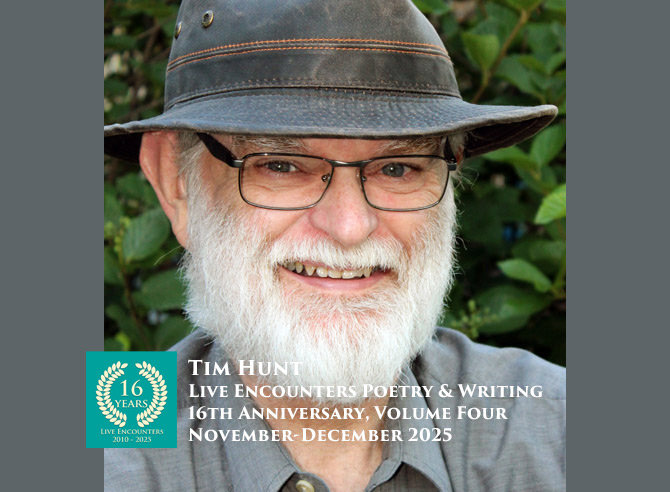
Live Encounters Poetry & Writing 16th Anniversary Volume Four
November- December 2025
1968, poems by Tim Hunt.
Is
The desert has a voice
and its voice is light.
At midday the light speaks the far ridge
as a shimmer—
the gliding hawk
a note of its music.
At dusk as the air cools
the light says let there be
dark
and the ridge stands forth against the sky.
But best is the moment
when the risen light
pauses
and says nothing at all—
and everything
is
1968
Do you remember when
we were so sure
that what mattered was injustice
as we wondered what to burn to make us free?
The boy at the war protest
burning a slip of paper that might,
as we watch from the crowd,
be a draft card
or driver’s license or library card,
who’s to say,
as the girl at his side admires
the waving bit of flame
and I think of the card in my wallet
that the law says I must carry,
and think, too, about Canada and jail,
and napalmed huts
and the quiet that probably follows
the burning
before the world murmurs on again.
Or the women, young and old,
at their different rally, burning their bras
to say they reject our gaze
as we gaze from the margin as if we understand.
Or the righteous flames in black and white—
the newspaper photos from Watts, Detroit,
the burning cars and gutted store fronts—
funeral pyres for the old order
that will reincarnate as the old order
as the embers cool to ash
and the weeds, in time, scabbing the cracked
and blackened concrete as these flames of anger and of hope,
of despair and love, fade—
as we come to know that what we burn
will not make us free,
whatever it was that we thought
Free might be.
Portuguese Beach,
Sonoma County, CA, 1969
and so, he is leaning
against this outcrop of rock,
his knees drawn up and looking
across the darkened water
at the moon.
He knows that its light is not his father’s light
and that this dark is not his father’s dark.
And as the night deepens,
he zips his jacket against the onshore breeze,
and the moon
begins to disappear below the horizon,
until there is only
his father’s light
and his father’s dark,
and he brings his mouth
to the barrel of his father’s rifle,
and takes it into his mouth
and holds it there,
cold against his tongue
and tasting the oil,
then opens his eyes
to the exploding glory
of the dark light.
© Tim Hunt
Tim Hunt is the author of six collections of poetry, including Western Where and Voice to Voice in the Dark (both Broadstone Books) and Ticket Stubs and Liner Notes, winner of the 2018 Main Street Rag Poetry Book Award. Recognitions include six Pushcart Prize Nominations, and the Chester H. Jones National Poetry Award for “Lake County Diamond” from his first collection Fault Lines (The Backwaters Press).
He has been a finalist for various book prizes, including, The Sexton Prize for Poetry, The Richard Snyder Publication Prize, The May Swenson Poetry Award, The Frederick Morgan Poetry Prize, The Nicholas Roerich Poetry Prize, Off the Grid Prize, The Saint Lawrence Book Award, and The Holland Prize. His critical work includes two studies of Jack Kerouac (Kerouac’s Crooked Road: Development of a Fiction and The Textuality of Soulwork: Kerouac’s Quest for Spontaneous Prose) and The Collected Poetry of Robinson Jeffers.
Originally from the hill country of northern California, he was educated at Cornell University and concluded his teaching career at Illinois State University where he was University Professor of English. He and his wife, Susan, live in Normal, Illinois.

